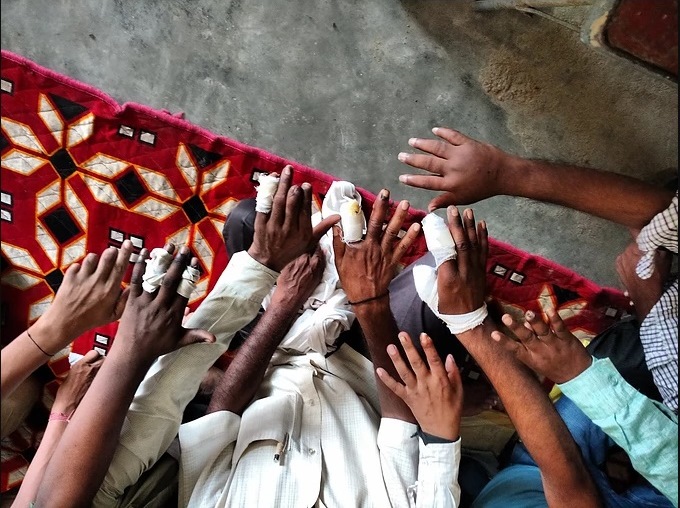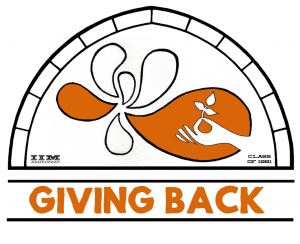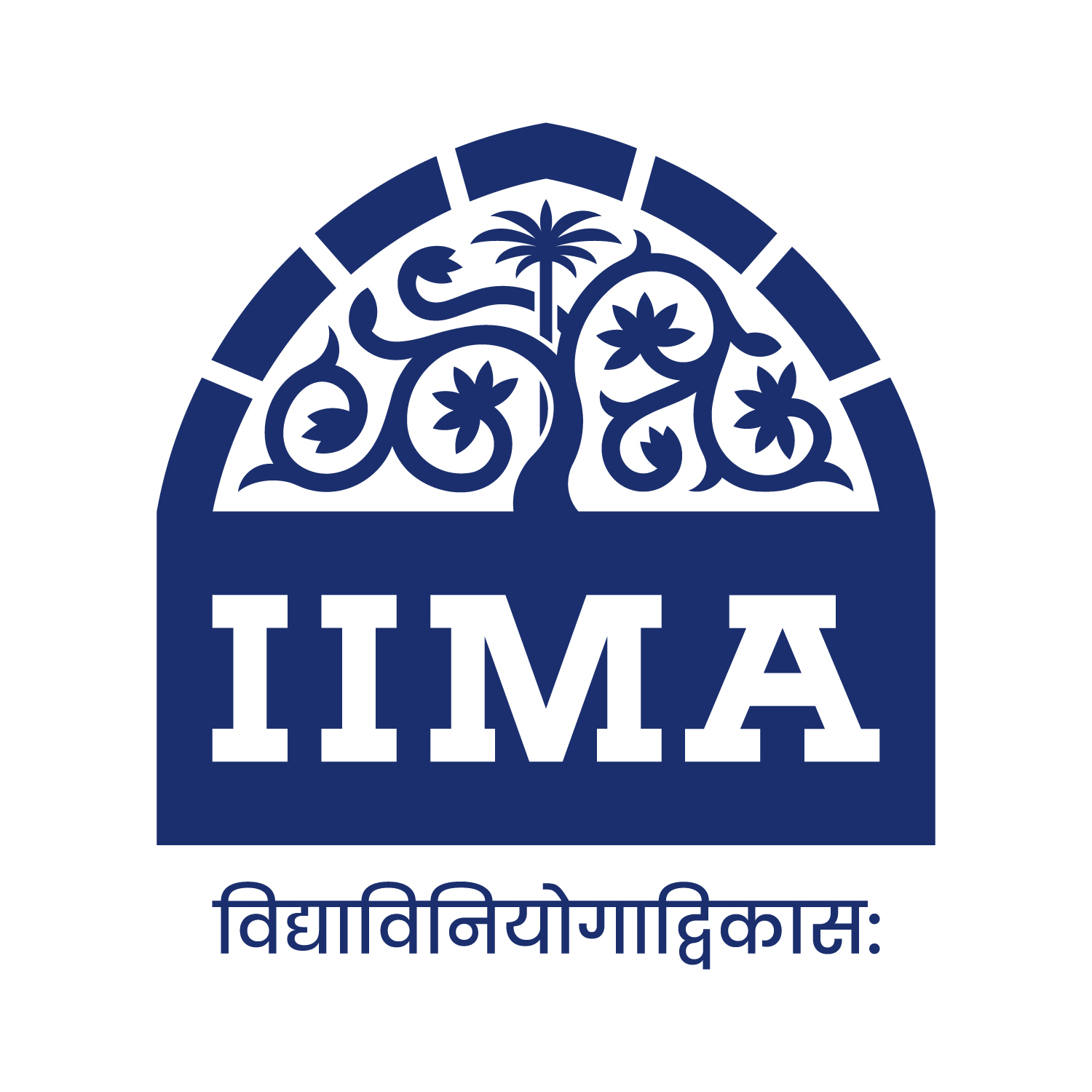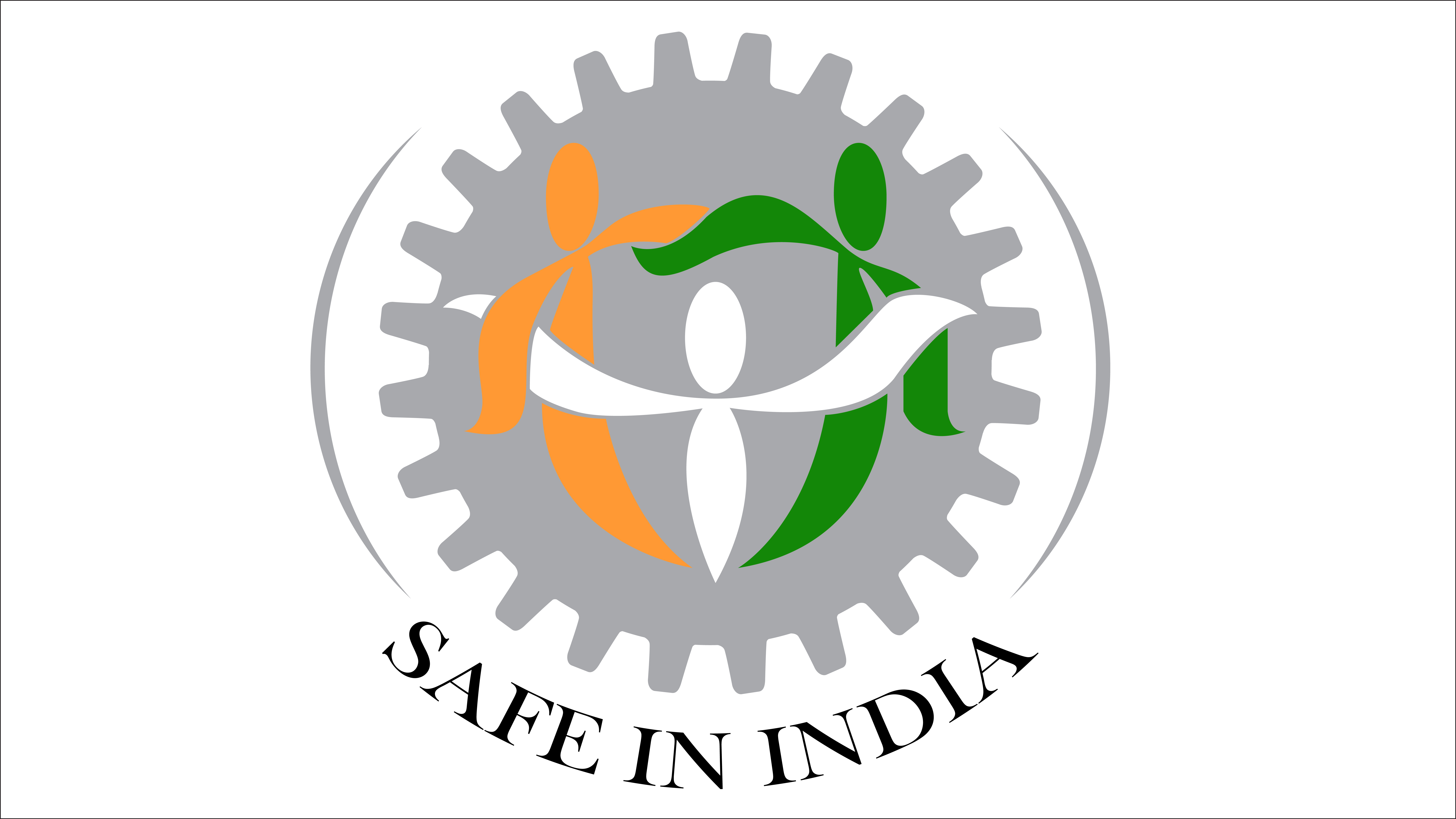Safe in India Foundation: An IIMA 1991 initiative

(Does your Car brand care for the lives of workers in its supply chain?)
Safe India Foundation is an IIMA ‘91 Batch supported social venture to address the issue of crush injuries in the Automotive Sector and work on win-win sustainable solutions. The co-founders of the initiative are Sandeep Sachdeva, Prabhat Agarwal and Ravi Gulati – all IIMA ‘91 batch alums. Below, Mr. Sandeep Sachdeva shares the experience, achievements and future plans of the foundation for the betterment of contract workers.
“My employer fired me after the accident. So I was facing difficulties in submitting the documents to ESIC. Only with the guidance from Safe-in-India, I received my arrears of Rs 17,000 and my pension will also start soon” – Bhola Ojha, Age 26 from Bihar (Medical Board done for pension after 14 Months of Accident)
Birth of Safe in India: It all started with a newspaper article in December ‘14 “20 workers a day lose their hands and fingers in auto sector manufacturing accidents in Gurgaon-Manesar”. Ravi Gulati, Prabhat Agarwal and I got together and decided to do something about it. Ravi, with his 25 years of experience of setting up Manzil, an NGO that has educated and mentored 20,000+ underprivileged children (he never took a proper corporate job), and Prabhat, who having sold off his successful start-ups, was already deeply involved in mentoring high IQ underprivileged children, Rahgiri and other social enterprises. I found my perfect partners-in-crime. A bored banker was ready to be excited again!
With all the critical reasoning IIMA had taught us, we started with a six months of research. After 20 detailed case studies of injured workers, we published a (surprisingly) first of its kind and well received Report in September ‘15. The problem was sadly not just large but multi-faceted, as indeed most social issues are. We could not find anyone actively solutioning, so the entrepreneurs in us saw a ripe opportunity to bring change. Safe in India was thus born in September ‘15 as a civil society initiative.
I had still to learn that determining and implementing solutions to such socio-economic problems was often more complex than managing billion dollar businesses, replete with bright hard-nosed minds focused on a single bottom line.

A worker explaining the ways in which hands get cut in power presses in a Focus Group discussion
Prevention or Cure: which comes first? With the above Report, we started meeting car brands in Gurgaon to influence them to prevent such accidents. We quickly learnt that safety in India is an unattractive business proposition. The cost of such accidents in India is just too low. Overpopulation, especially among marginal farmers in rural India, feeds an unending supply of unskilled workers to the manufacturers, who dictate terms of employment and conditions of work, and lose little in case of industrial accidents.
So, we pivoted and established a Worker Assistance Centre in Manesar in December ‘16. The idea was to provide the much needed urgent support to these workers, with severe crush injuries, after the accident, with their healthcare and compensations from ESIC (Employee State Insurance Corporation). Aajeevika Bureau, probably the most respected NGO in immigrant worker issues in India, agreed to incubate us, helping us to focus on impact, rather than administration from day one. The Worker Assistance Centre also ensured that we obtained access to valuable data and insights regarding these accidents.
Why should anyone trust us with their problems? Winning credibility among workers was an unexpected and huge early challenge. Workers, exploited by factories, contractors, lawyers, even their landlords, are justifiably cynical. They could not believe that we could get them cash and not charge any commission! It took our hard working team, of Masab Shamsi, Amitesh Kumar, Ram Babu (an injured worker himself), Jitendra Kumar and Sandeep Singh (a visually impaired IITR 87 graduate), a year to increase our monthly conversion rate (registration to full file for compensation assistance) from 5% of now stable 45%.

Father of a worker who lost his fingers as Safe in India worker event attended by 100+ workers
The batch of IIMA 91 steps up: IIMA ka tempo high Hai! And how do we do it free? At our 25th anniversary celebrations at the campus in December ‘15, almost a 100 batch-mates pooled in Rs1.5cr, of which Safe in India received Rs 50 lacs. This year again the batch has contributed another similar amount. Even more valuable is their huge moral and other support with government contacts (Monika), IT system development (Danny), analytics (RoyC), worker app suggestions (Dipti), logo design (Moulee), AV content (Samir), social sector expertise (Doc, Bhushi), auto sector and other strategic advise (Dixie, Joy, Raja, Dhall, YVS) and I am sure I am missing many (my sincere apologies).
Our credibility among stakeholders is strengthened by the fact that we are funded by Indian individuals and do not take any foreign or even CSR/Foundation funding. This will change in future once we have built three year financial track-record but for now this is a powerful argument.
Helping improve ESIC systemically: We knew that ultimately we had to help in changing ESIC for all the workers to provide long term sustainable support to them. It is unfortunately not surprising that the ESIC processes are designed to make ESIC “babus” lives easier – opposite of what we in corporate life know as customer centric processes; customer being the insurance premium paying worker.
So, since March ‘17, we have been sending monthly Management Information to them, have recommended significant changes in ESIC Act and Regulations 1952, made many process-reengineering suggestions, and highlighted a number of on-the-ground operational, non-compliance, corrupt and inefficient practices.
We have now helped 1400+ injured workers with their healthcare, and have helped obtain Rs 5 crore+ compensation for them. Our ESIC team has now become a respected expert in ESIC processes and our internal processes are mapped to theirs.
After escalating data-informed issues and suggestions, quarterly, until we reached DG-ESIC and the Labour Minister, they have now agreed to implement a number of our recommendations like launching a worker app for information and follow up, improving grievance process and creating better audio-visual information for workers. There are many other more strategic recommendations that we still need to keep pushing. If we are able to achieve any success in, we will be able to help 8cr+ workers in the country directly and indirectly. This will probably be a 3 to 5 years journey to make a significant impact. All within 18 months of starting the Worker Assistance Centre!
So now on to Prevention! In the process of helping these 1,400+ workers, we have collected 30,000+ data points to understand the nature and causes of these accidents.
54% of accidents happen on only one type of machine (power press), 70% of injured workers are below 30 years of age, 90% are migrants, 67% are contract workers and 90% are from Maruti, Hero and Honda supply chains. Almost half of them get their ESIC card only on the day of or after the accident; safety mechanisms are missing/malfunctioning in majority of machines.
Most accidents happen in Tier 2/3/4 factories i.e. suppliers to direct supplier to OEMs, where many a times lowly paid and unskilled helpers at Rs 9,000 pm salary are coerced to do Rs 12,000+ skilled machine operator job without training, inevitably resulting in such accidents.
We are now in the process of analysing this data to identify issues and recommendations to improve safety in auto-sector supply chain. Chitra Khanna has joined us as head of Safety and our Safety Report is expected to be published by Sep18.
Due to our escalation of ESIC issues, the Labour Ministry has helpfully agreed to create a senior safety working group, including an Addl Secretary – Labour, DG ESIC and DG FASLI (government’s safety arm) to drive the prevention agenda. We hope to drive win-win solutions with pragmatism, and support from investors, media, government and customers. This will probably be a 5-10 year journey to make a significant sustainable impact.

Women too work in such factories and have similar crush injuries
What can you do?
- Think of our workers, many of who come from marginal farming families looking for that extra income that agriculture is unable to provide them.
- Ask your car and two-wheeler dealer about what their brands do for workers in their supply chain all the way to the last supplier. Make their life difficult and ask them to find answers from their OEMs.
- If you have time and/or relevant contacts, give us some. We need quality professionals and thinkers help us punch above our weight.
- Then there is always cash, something that many NGO founders end up spending more time than on the cause itself. We would rather avoid that.
Sandeep Sachdeva is the Co-Founder CEO of www.safeinindia.org. Should you wish to support Safe in India in any way, please contact him at sandeep.sachdeva@safeinindia.org. You can also subscribe to quarterly updates on the home page, and look at our past updates on www.safeinindia.org/blog. Donation details are www.safeinindia.org/donate. The OEM brands are not disclosed here as our first step is to hopefully agree positive actions first. NB: The three Co-Founders do NOT claim any compensation or reimbursement for their time and expenditure, and also donate cash.
Brijesh Kumar: Coerced to work on a poorly maintained machine Brijesh Kumar, 30 years old migrant from UP came to Manesar for employment in 2010 and had six years of experience. On 2 March ‘16, he complained about malfunctioining of the molding machine that needed urgent maintenance. His supervisor, despite his protests, coerced him to use this machine, resulting in an accident and a dysfunctional left hand. Now, permanently disabled, he has had to go back to his village. His factory was a sub-contractor in the supply chain of Maruti, Hero and Honda.
Narottam Kumar: A young BSc student lost a finger on the third day of his first job Narottam Jadav, 23 years old, came to Manesar in April 2016 to afford his ongoing BSc education. Within three days of joining as a contract worker, he lost his left hand index finger in a power press. His company supplies parts to Hero, Honda, Tata and Mahindra. After the accident, he received no support from his contractor or the employer and his employment was terminated.
Ravi: Helper asked to work as an Operator Ravi, a 19 years old boy, came to Manesar in 2018 and took up a job as a helper. On 29 March ‘18, the 15 day of his joining, he was forced by his supervisor to work as an operator on a power press. Due to lack of experience and training, he met with an accident on the same day, lost two fingers and has now gone back to his village.




Sorry, the comment form is closed at this time.